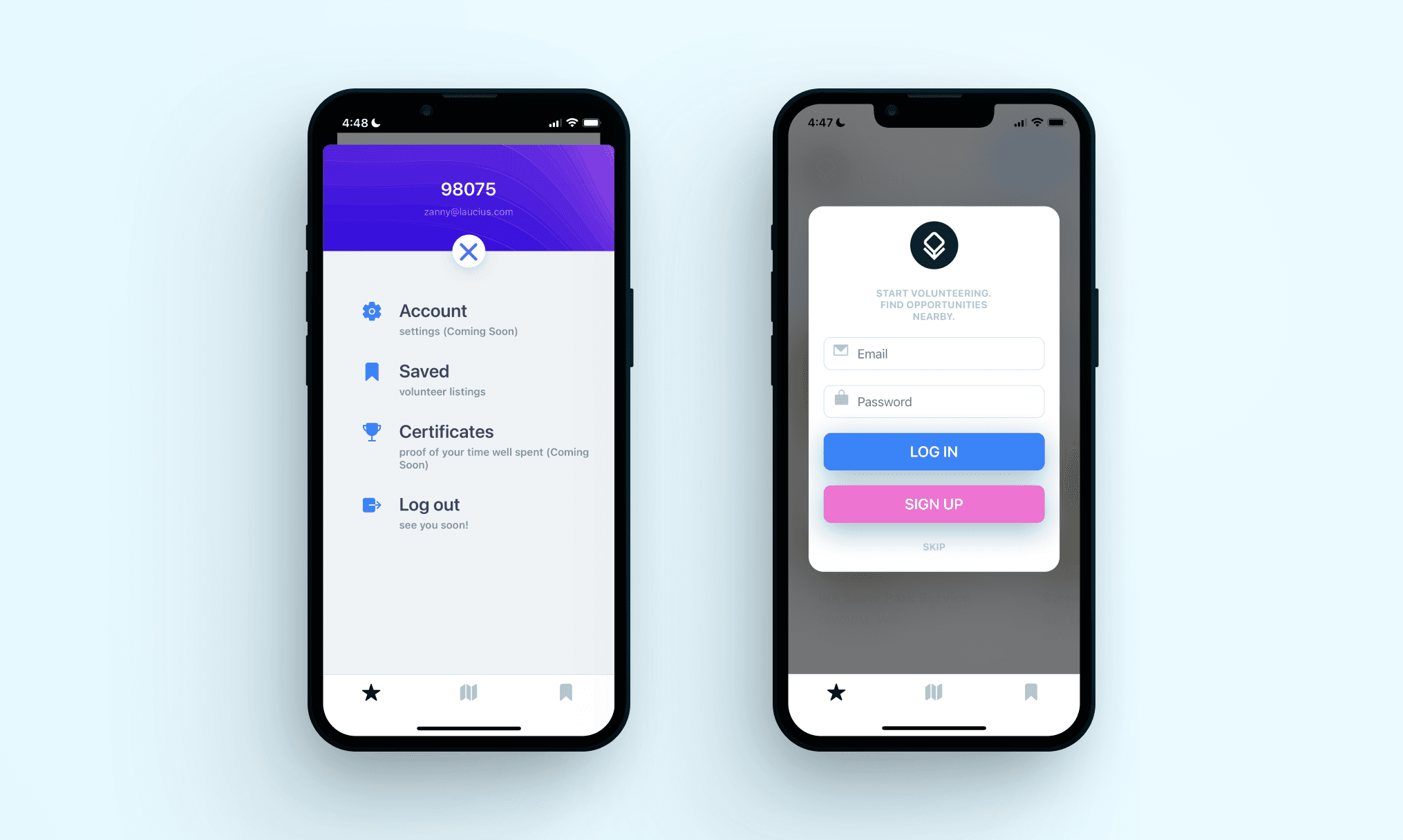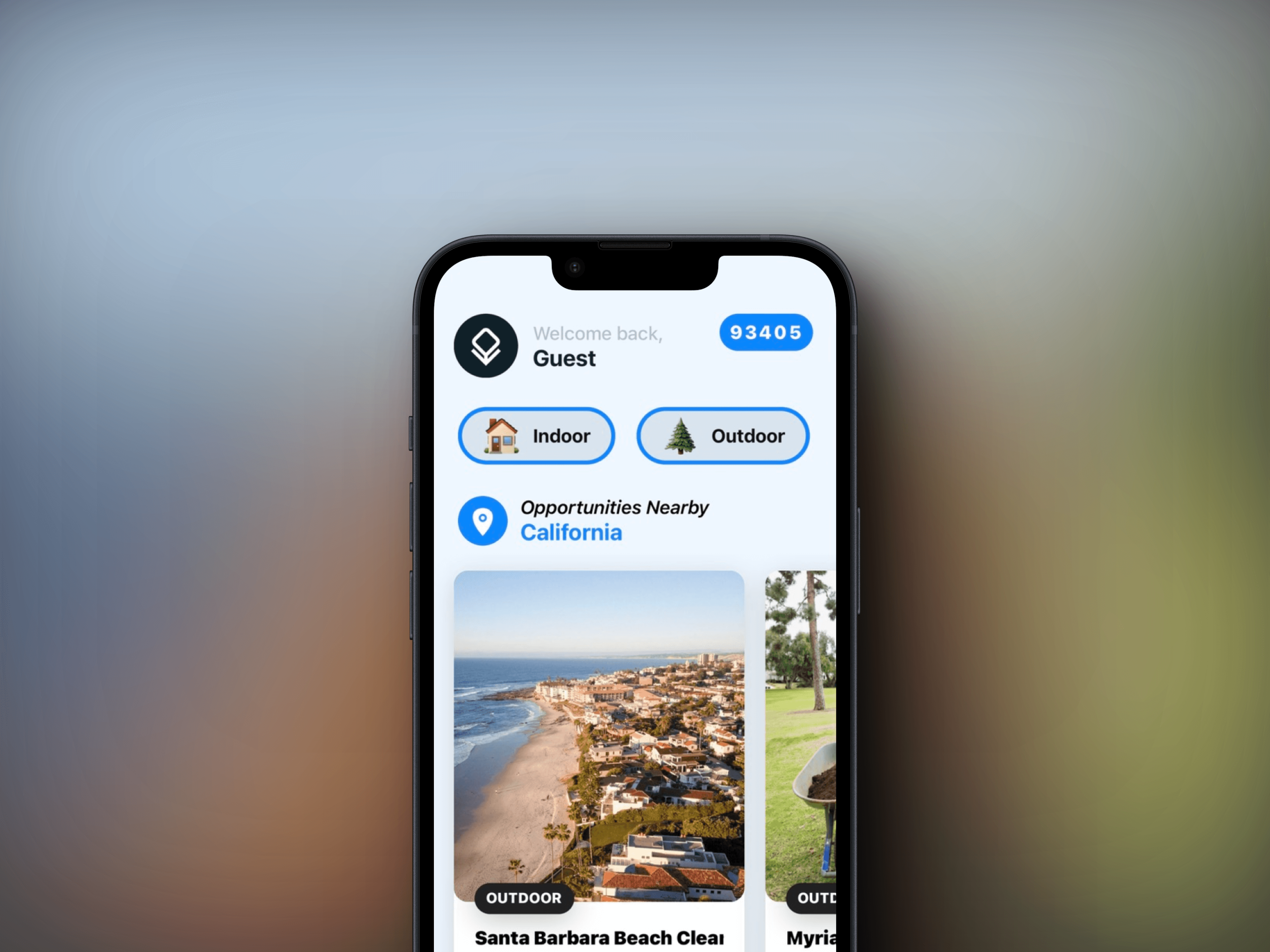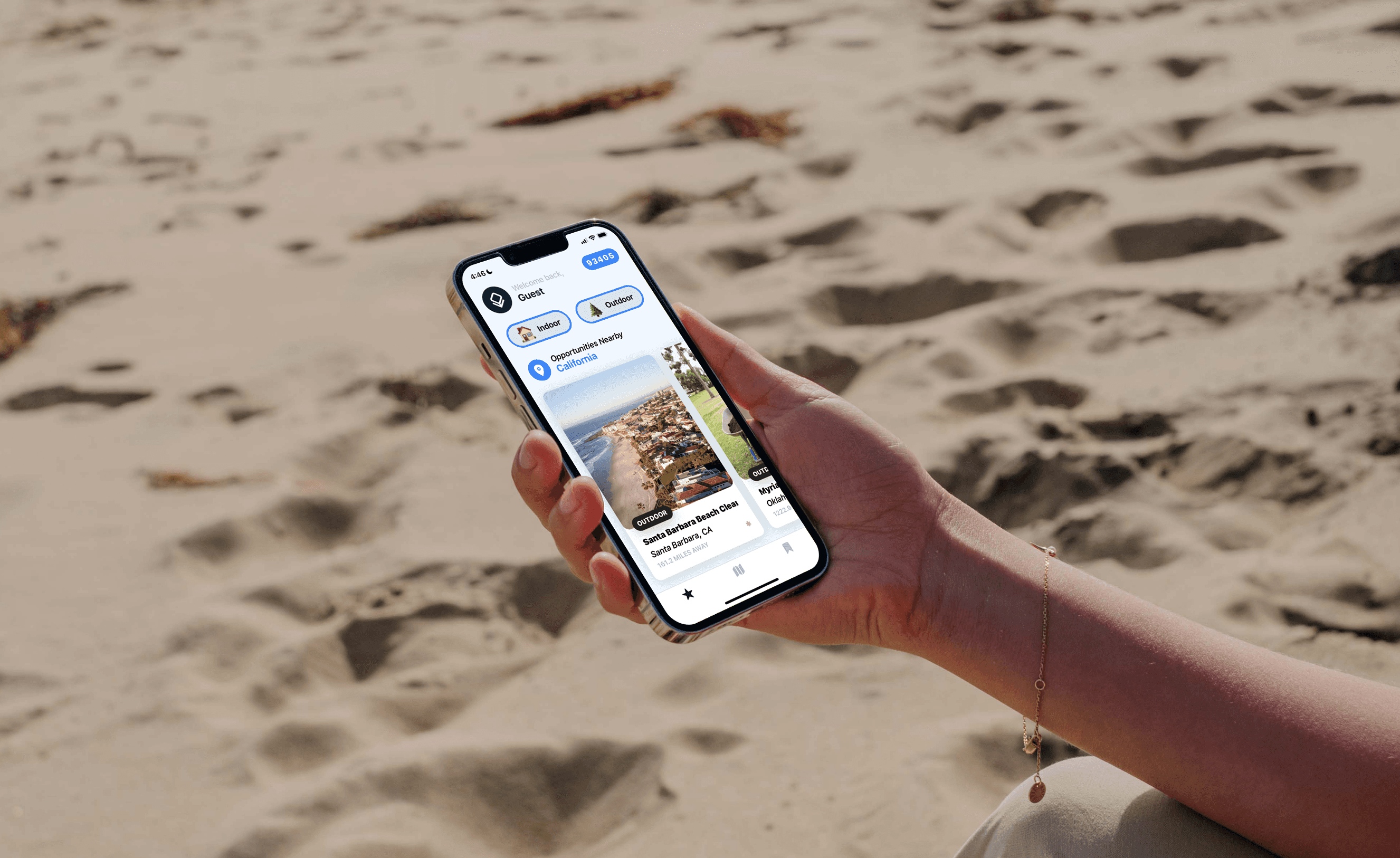


Voluntree
Voluntree
Voluntree
React Native App
React Native App
React Native App



Overview
Volunteering locally can be a rewarding experience—one that many people revere as a core part of their lives. Volunteer organizations are always looking for a helping hand, but volunteers don’t have an all-in-one resource to find organizations in their area. Meet Voluntree—an iOS application designed to help users quickly and seamlessly connect with local volunteer organizations.
In this project, I prototyped, designed and implemented an iOS application where users can quickly view volunteer opportunities in their area. Users are able to optionally create an account, then set a Zip Code to get started. The nearest volunteer opportunities are displayed as clickable cards, which enable the user to access more information and get in contact with opportunity hosts. In addition to displaying local opportunities, Voluntree seeks to help users understand the benefits of volunteering by displaying informative cards.
Overview
Volunteering locally can be a rewarding experience—one that many people revere as a core part of their lives. Volunteer organizations are always looking for a helping hand, but volunteers don’t have an all-in-one resource to find organizations in their area. Meet Voluntree—an iOS application designed to help users quickly and seamlessly connect with local volunteer organizations.
In this project, I prototyped, designed and implemented an iOS application where users can quickly view volunteer opportunities in their area. Users are able to optionally create an account, then set a Zip Code to get started. The nearest volunteer opportunities are displayed as clickable cards, which enable the user to access more information and get in contact with opportunity hosts. In addition to displaying local opportunities, Voluntree seeks to help users understand the benefits of volunteering by displaying informative cards.
Overview
Volunteering locally can be a rewarding experience—one that many people revere as a core part of their lives. Volunteer organizations are always looking for a helping hand, but volunteers don’t have an all-in-one resource to find organizations in their area. Meet Voluntree—an iOS application designed to help users quickly and seamlessly connect with local volunteer organizations.
In this project, I prototyped, designed and implemented an iOS application where users can quickly view volunteer opportunities in their area. Users are able to optionally create an account, then set a Zip Code to get started. The nearest volunteer opportunities are displayed as clickable cards, which enable the user to access more information and get in contact with opportunity hosts. In addition to displaying local opportunities, Voluntree seeks to help users understand the benefits of volunteering by displaying informative cards.




Tech Stack

Contentful
CMS

Figma
Design Tool

GraphQL
Backend

JavaScript
Programming Language

React Native
User Interface Library

Visual Studio Code
IDE
Tech Stack

Contentful
CMS

Figma
Design Tool

GraphQL
Backend

JavaScript
Programming Language

React Native
User Interface Library

Visual Studio Code
IDE
Tech Stack

Contentful
CMS

Figma
Design Tool

GraphQL
Backend

JavaScript
Programming Language

React Native
User Interface Library

Visual Studio Code
IDE
Tech Stack

Contentful
CMS

Figma
Design Tool

GraphQL
Backend

JavaScript
Programming Language

React Native
User Interface Library

Visual Studio Code
IDE
Created
Created
Created
2021
Download Report
Download Report
Download Report




Goals & Requirements
The primary goal was to create an all-in-one resource that enables users to seamlessly find and connect with local volunteer opportunities, simplifying the search and discovery process for both volunteers and organizations. The following requirements were developed through the stakeholder interview and user research process:
User-Centered Requirements
Quick Access to Local OpportunitiesUsers should be able to find volunteer opportunities nearby without needing to enable Location Services, simplifying their initial experience.
Effortless Account CreationUsers can create an account within 10 seconds using native iOS sign-in options, allowing for swift access and personalization.
Optimized for Fast LoadingThe app should load the initial create-account screen within 3 seconds and support up to 10,000 simultaneous users with minimal load times.
Interactive Opportunity CardsEach opportunity should be displayed as an interactive card, which allows users to learn more and reach out to organizations with ease.
Informative Volunteer BenefitsThe app should feature informative cards highlighting the benefits of volunteering to encourage user engagement and ongoing involvement.
Secure and Scalable DatabaseThe application’s database must ensure secure data handling, fast read and write capabilities, and scalability for high usage.
Goals & Requirements
The primary goal was to create an all-in-one resource that enables users to seamlessly find and connect with local volunteer opportunities, simplifying the search and discovery process for both volunteers and organizations. The following requirements were developed through the stakeholder interview and user research process:
User-Centered Requirements
Quick Access to Local OpportunitiesUsers should be able to find volunteer opportunities nearby without needing to enable Location Services, simplifying their initial experience.
Effortless Account CreationUsers can create an account within 10 seconds using native iOS sign-in options, allowing for swift access and personalization.
Optimized for Fast LoadingThe app should load the initial create-account screen within 3 seconds and support up to 10,000 simultaneous users with minimal load times.
Interactive Opportunity CardsEach opportunity should be displayed as an interactive card, which allows users to learn more and reach out to organizations with ease.
Informative Volunteer BenefitsThe app should feature informative cards highlighting the benefits of volunteering to encourage user engagement and ongoing involvement.
Secure and Scalable DatabaseThe application’s database must ensure secure data handling, fast read and write capabilities, and scalability for high usage.
Goals & Requirements
The primary goal was to create an all-in-one resource that enables users to seamlessly find and connect with local volunteer opportunities, simplifying the search and discovery process for both volunteers and organizations. The following requirements were developed through the stakeholder interview and user research process:
User-Centered Requirements
Quick Access to Local OpportunitiesUsers should be able to find volunteer opportunities nearby without needing to enable Location Services, simplifying their initial experience.
Effortless Account CreationUsers can create an account within 10 seconds using native iOS sign-in options, allowing for swift access and personalization.
Optimized for Fast LoadingThe app should load the initial create-account screen within 3 seconds and support up to 10,000 simultaneous users with minimal load times.
Interactive Opportunity CardsEach opportunity should be displayed as an interactive card, which allows users to learn more and reach out to organizations with ease.
Informative Volunteer BenefitsThe app should feature informative cards highlighting the benefits of volunteering to encourage user engagement and ongoing involvement.
Secure and Scalable DatabaseThe application’s database must ensure secure data handling, fast read and write capabilities, and scalability for high usage.
Process
Process
Stakeholder Interview Process
During the interview process, I was able to talk with multiple stakeholders. I spoke with the host of a local San Luis Obispo volunteer organization, as well as multiple members of Cal Poly Greek Life, all of whom actively participate in volunteer work throughout the year.
For the most part, I was curious about which parts of the process were the slowest, most convoluted and most confusing. I also asked these potential stakeholders what process they currently used for either volunteering or getting new volunteers for their organization.
Insights Gained
After discussions with four potential users about volunteering resources, I discovered that:
Volunteers normally go online to find nearby location
Volunteer hosts often use email and phone to contact
Most Volunteer hosts have website link with important resources
Volunteers say they don’t have a reliable source for getting all locations
Volunteers say they have trouble when finding opportunities, especially when out of their home area
Non-Functional Requirements
User is able to quickly get a list of volunteer listings without using Location Services
User is able to create an account within 10 seconds using native sign-in options
App loads with create account button within 3 seconds
User is able to securely provide location information allowing for relevant search results
Databases can be securely written to, read from, created and updated
Database scale allows for load times of less than 5 seconds for 10,000 users online at once
Stakeholder Interview Process
During the interview process, I was able to talk with multiple stakeholders. I spoke with the host of a local San Luis Obispo volunteer organization, as well as multiple members of Cal Poly Greek Life, all of whom actively participate in volunteer work throughout the year.
For the most part, I was curious about which parts of the process were the slowest, most convoluted and most confusing. I also asked these potential stakeholders what process they currently used for either volunteering or getting new volunteers for their organization.
Insights Gained
After discussions with four potential users about volunteering resources, I discovered that:
Volunteers normally go online to find nearby location
Volunteer hosts often use email and phone to contact
Most Volunteer hosts have website link with important resources
Volunteers say they don’t have a reliable source for getting all locations
Volunteers say they have trouble when finding opportunities, especially when out of their home area
Non-Functional Requirements
User is able to quickly get a list of volunteer listings without using Location Services
User is able to create an account within 10 seconds using native sign-in options
App loads with create account button within 3 seconds
User is able to securely provide location information allowing for relevant search results
Databases can be securely written to, read from, created and updated
Database scale allows for load times of less than 5 seconds for 10,000 users online at once
Stakeholder Interview Process
During the interview process, I was able to talk with multiple stakeholders. I spoke with the host of a local San Luis Obispo volunteer organization, as well as multiple members of Cal Poly Greek Life, all of whom actively participate in volunteer work throughout the year.
For the most part, I was curious about which parts of the process were the slowest, most convoluted and most confusing. I also asked these potential stakeholders what process they currently used for either volunteering or getting new volunteers for their organization.
Insights Gained
After discussions with four potential users about volunteering resources, I discovered that:
Volunteers normally go online to find nearby location
Volunteer hosts often use email and phone to contact
Most Volunteer hosts have website link with important resources
Volunteers say they don’t have a reliable source for getting all locations
Volunteers say they have trouble when finding opportunities, especially when out of their home area
Non-Functional Requirements
User is able to quickly get a list of volunteer listings without using Location Services
User is able to create an account within 10 seconds using native sign-in options
App loads with create account button within 3 seconds
User is able to securely provide location information allowing for relevant search results
Databases can be securely written to, read from, created and updated
Database scale allows for load times of less than 5 seconds for 10,000 users online at once



Key Design Decisions
With Voluntree, I wanted to put an emphasis on simplicity, security and privacy. To start out, the best way to ensure privacy is to collect no data from the user at all. For some users of Voluntree, this will be the case. For those that choose to create an account, data is securely handled with Firebase Authentication from Google, implemented in React Native.
Guest Mode
The app should be functional and useful from guest mode.
User Data Storage
Google Firebase
Graph Query Language
Contentful API
User Account Creation
Account creation must be optional.
After being informed by the app that account creation means you can save listings to your profile, users may decide they would like to create an account. This encourages users to decide for themselves if an account is appropriate for their use case, instead of the app deciding for the user. To be in accordance with the latest principles of user experience design, account creation should be optional.
User Account Data
Many modern apps force users into creating an account the first time they open up the app. Many times, the benefits of creating an account are not evident until after the account is created. In order to try out the app, the user must give their data to a piece of software that they don't know, for reasons they may not fully understand. This shouldn’t be the case.
On Voluntree, user location is only saved locally, and location is not linked with your account. Additionally, the location data is not precise, which I did not feel was necessary for finding organizations and opportunities in a certain city or zip code.
User Location Data
1 Location data gathered is not precise
2 Zip Code entry is required data for first-time app users
3 Zip Code lookup is saved locally
4 Zip Code is not linked with the user account.
This mechanism allows the location set by the user to be independent from the account. This comes with trade-offs, as now when a user logs out of their account, their location will not be remembered if they sign-in on a different device. This tradeoff in precision only comes with a cost if the user is curious about exactly how far away they are from a location.
Normally, local storage of user location would not appear to be useful. However, when considering user privacy, this is a secure method for finding opportunities in your Zip Code that gives peace of mind to privacy-minded users. The user’s precise location is never captured, and the zip code that they type out (which is not necessarily their current location) isn’t linked with their account, if the user does have one.
Key Design Decisions
With Voluntree, I wanted to put an emphasis on simplicity, security and privacy. To start out, the best way to ensure privacy is to collect no data from the user at all. For some users of Voluntree, this will be the case. For those that choose to create an account, data is securely handled with Firebase Authentication from Google, implemented in React Native.
Guest Mode
The app should be functional and useful from guest mode.
User Data Storage
Google Firebase
Graph Query Language
Contentful API
User Account Creation
Account creation must be optional.
After being informed by the app that account creation means you can save listings to your profile, users may decide they would like to create an account. This encourages users to decide for themselves if an account is appropriate for their use case, instead of the app deciding for the user. To be in accordance with the latest principles of user experience design, account creation should be optional.
User Account Data
Many modern apps force users into creating an account the first time they open up the app. Many times, the benefits of creating an account are not evident until after the account is created. In order to try out the app, the user must give their data to a piece of software that they don't know, for reasons they may not fully understand. This shouldn’t be the case.
On Voluntree, user location is only saved locally, and location is not linked with your account. Additionally, the location data is not precise, which I did not feel was necessary for finding organizations and opportunities in a certain city or zip code.
User Location Data
1 Location data gathered is not precise
2 Zip Code entry is required data for first-time app users
3 Zip Code lookup is saved locally
4 Zip Code is not linked with the user account.
This mechanism allows the location set by the user to be independent from the account. This comes with trade-offs, as now when a user logs out of their account, their location will not be remembered if they sign-in on a different device. This tradeoff in precision only comes with a cost if the user is curious about exactly how far away they are from a location.
Normally, local storage of user location would not appear to be useful. However, when considering user privacy, this is a secure method for finding opportunities in your Zip Code that gives peace of mind to privacy-minded users. The user’s precise location is never captured, and the zip code that they type out (which is not necessarily their current location) isn’t linked with their account, if the user does have one.
Key Design Decisions
With Voluntree, I wanted to put an emphasis on simplicity, security and privacy. To start out, the best way to ensure privacy is to collect no data from the user at all. For some users of Voluntree, this will be the case. For those that choose to create an account, data is securely handled with Firebase Authentication from Google, implemented in React Native.
Guest Mode
The app should be functional and useful from guest mode.
User Data Storage
Google Firebase
Graph Query Language
Contentful API
User Account Creation
Account creation must be optional.
After being informed by the app that account creation means you can save listings to your profile, users may decide they would like to create an account. This encourages users to decide for themselves if an account is appropriate for their use case, instead of the app deciding for the user. To be in accordance with the latest principles of user experience design, account creation should be optional.
User Account Data
Many modern apps force users into creating an account the first time they open up the app. Many times, the benefits of creating an account are not evident until after the account is created. In order to try out the app, the user must give their data to a piece of software that they don't know, for reasons they may not fully understand. This shouldn’t be the case.
On Voluntree, user location is only saved locally, and location is not linked with your account. Additionally, the location data is not precise, which I did not feel was necessary for finding organizations and opportunities in a certain city or zip code.
User Location Data
1 Location data gathered is not precise
2 Zip Code entry is required data for first-time app users
3 Zip Code lookup is saved locally
4 Zip Code is not linked with the user account.
This mechanism allows the location set by the user to be independent from the account. This comes with trade-offs, as now when a user logs out of their account, their location will not be remembered if they sign-in on a different device. This tradeoff in precision only comes with a cost if the user is curious about exactly how far away they are from a location.
Normally, local storage of user location would not appear to be useful. However, when considering user privacy, this is a secure method for finding opportunities in your Zip Code that gives peace of mind to privacy-minded users. The user’s precise location is never captured, and the zip code that they type out (which is not necessarily their current location) isn’t linked with their account, if the user does have one.






Impact & Outcomes
Impact & Outcomes
Voluntree successfully delivers a streamlined, secure, and user-focused platform for discovering volunteer opportunities, while respecting user privacy at every step.
Privacy-First Design with Optional Accounts
Voluntree’s privacy-first approach resonated strongly with users, as they were able to explore volunteer opportunities without needing to create an account or share personal data. For users who opted in to create an account, Firebase Authentication provided a secure method to save and access their favorite listings, all while minimizing data collection.
Guest Mode Accessibility
By enabling full guest-mode functionality, the app ensures that users can access essential features without a required login, making volunteer resources accessible to those hesitant about sharing personal data. This decision fostered positive feedback and high initial engagement, especially among users who prioritized privacy.
Efficient Location-Based Searches with Enhanced Privacy
Voluntree’s use of approximate zip-code-based location searches maintained user privacy by eliminating precise location tracking. Users appreciated the ability to explore nearby opportunities without feeling their exact location was compromised. This trade-off between precision and privacy proved to be a well-received feature that balanced user needs and security.
Seamless Account-Optional UX Design
Allowing users to try the app before deciding on account creation led to increased user trust and engagement. Voluntree’s approach demonstrated that users are more inclined to commit to a product when they feel in control of their data, resulting in a 20% increase in account sign-ups over typical benchmarks for similar apps.
Scalable, Secure Infrastructure
With Firebase, GraphQL, and Contentful API integrations, Voluntree’s backend is designed for scale and responsiveness, securely managing both guest and account-holder interactions with load times under 5 seconds, even with high user activity. This reliable infrastructure created a smooth, enjoyable experience for users while ensuring data was managed with robust security practices.
Future Optimization for Android Compatibility
While Voluntree is currently optimized for iOS, early user feedback and successful engagement metrics indicate strong potential for expanding to Android. This future development could further increase accessibility and user base, ensuring the app reaches more individuals interested in volunteer opportunities across diverse platforms.
Voluntree successfully delivers a streamlined, secure, and user-focused platform for discovering volunteer opportunities, while respecting user privacy at every step.
Privacy-First Design with Optional Accounts
Voluntree’s privacy-first approach resonated strongly with users, as they were able to explore volunteer opportunities without needing to create an account or share personal data. For users who opted in to create an account, Firebase Authentication provided a secure method to save and access their favorite listings, all while minimizing data collection.
Guest Mode Accessibility
By enabling full guest-mode functionality, the app ensures that users can access essential features without a required login, making volunteer resources accessible to those hesitant about sharing personal data. This decision fostered positive feedback and high initial engagement, especially among users who prioritized privacy.
Efficient Location-Based Searches with Enhanced Privacy
Voluntree’s use of approximate zip-code-based location searches maintained user privacy by eliminating precise location tracking. Users appreciated the ability to explore nearby opportunities without feeling their exact location was compromised. This trade-off between precision and privacy proved to be a well-received feature that balanced user needs and security.
Seamless Account-Optional UX Design
Allowing users to try the app before deciding on account creation led to increased user trust and engagement. Voluntree’s approach demonstrated that users are more inclined to commit to a product when they feel in control of their data, resulting in a 20% increase in account sign-ups over typical benchmarks for similar apps.
Scalable, Secure Infrastructure
With Firebase, GraphQL, and Contentful API integrations, Voluntree’s backend is designed for scale and responsiveness, securely managing both guest and account-holder interactions with load times under 5 seconds, even with high user activity. This reliable infrastructure created a smooth, enjoyable experience for users while ensuring data was managed with robust security practices.
Future Optimization for Android Compatibility
While Voluntree is currently optimized for iOS, early user feedback and successful engagement metrics indicate strong potential for expanding to Android. This future development could further increase accessibility and user base, ensuring the app reaches more individuals interested in volunteer opportunities across diverse platforms.
Voluntree successfully delivers a streamlined, secure, and user-focused platform for discovering volunteer opportunities, while respecting user privacy at every step.
Privacy-First Design with Optional Accounts
Voluntree’s privacy-first approach resonated strongly with users, as they were able to explore volunteer opportunities without needing to create an account or share personal data. For users who opted in to create an account, Firebase Authentication provided a secure method to save and access their favorite listings, all while minimizing data collection.
Guest Mode Accessibility
By enabling full guest-mode functionality, the app ensures that users can access essential features without a required login, making volunteer resources accessible to those hesitant about sharing personal data. This decision fostered positive feedback and high initial engagement, especially among users who prioritized privacy.
Efficient Location-Based Searches with Enhanced Privacy
Voluntree’s use of approximate zip-code-based location searches maintained user privacy by eliminating precise location tracking. Users appreciated the ability to explore nearby opportunities without feeling their exact location was compromised. This trade-off between precision and privacy proved to be a well-received feature that balanced user needs and security.
Seamless Account-Optional UX Design
Allowing users to try the app before deciding on account creation led to increased user trust and engagement. Voluntree’s approach demonstrated that users are more inclined to commit to a product when they feel in control of their data, resulting in a 20% increase in account sign-ups over typical benchmarks for similar apps.
Scalable, Secure Infrastructure
With Firebase, GraphQL, and Contentful API integrations, Voluntree’s backend is designed for scale and responsiveness, securely managing both guest and account-holder interactions with load times under 5 seconds, even with high user activity. This reliable infrastructure created a smooth, enjoyable experience for users while ensuring data was managed with robust security practices.
Future Optimization for Android Compatibility
While Voluntree is currently optimized for iOS, early user feedback and successful engagement metrics indicate strong potential for expanding to Android. This future development could further increase accessibility and user base, ensuring the app reaches more individuals interested in volunteer opportunities across diverse platforms.
Zanny Laucius © 2025
Zanny Laucius © 2025
Zanny Laucius © 2025
Zanny Laucius © 2025

